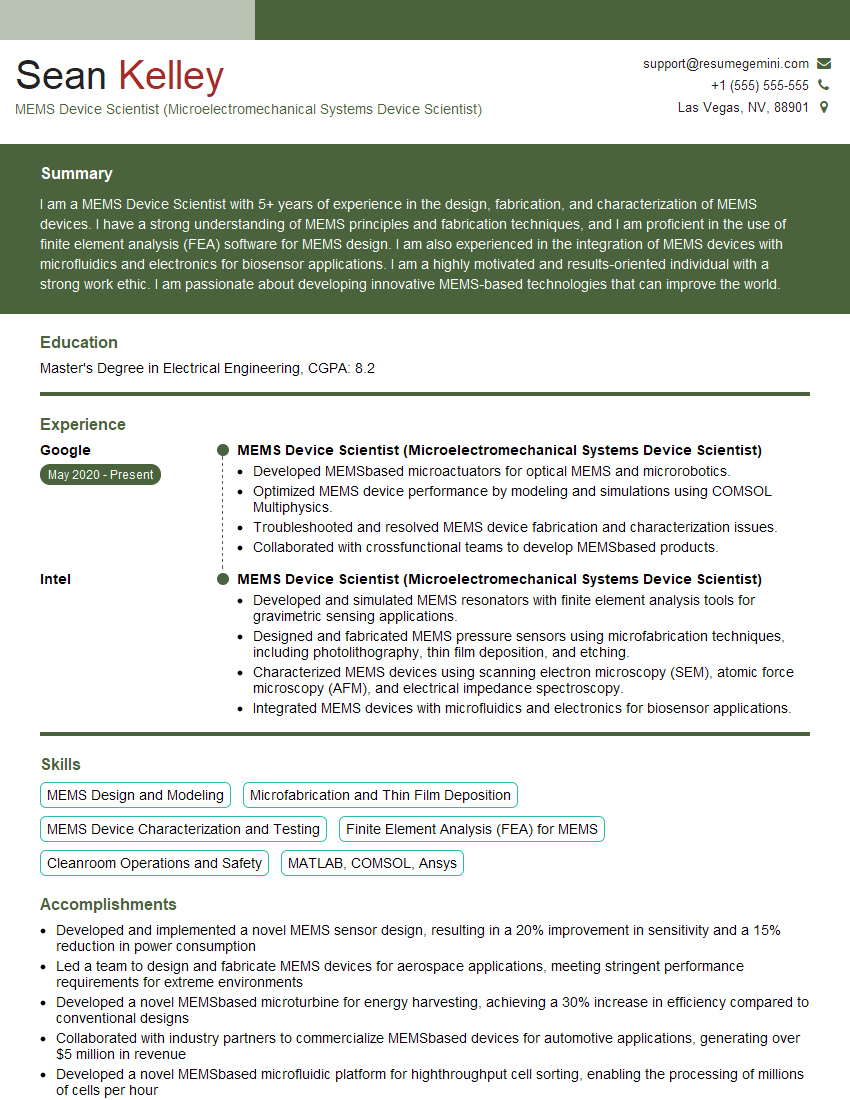Are you a seasoned MEMS Device Scientist (Microelectromechanical Systems Device Scientist) seeking a new career path? Discover our professionally built MEMS Device Scientist (Microelectromechanical Systems Device Scientist) Resume Template. This time-saving tool provides a solid foundation for your job search. Simply click “Edit Resume” to customize it with your unique experiences and achievements. Customize fonts and colors to match your personal style and increase your chances of landing your dream job. Explore more Resume Templates for additional options.

Sean Kelley
MEMS Device Scientist (Microelectromechanical Systems Device Scientist)
Summary
I am a MEMS Device Scientist with 5+ years of experience in the design, fabrication, and characterization of MEMS devices. I have a strong understanding of MEMS principles and fabrication techniques, and I am proficient in the use of finite element analysis (FEA) software for MEMS design. I am also experienced in the integration of MEMS devices with microfluidics and electronics for biosensor applications. I am a highly motivated and results-oriented individual with a strong work ethic. I am passionate about developing innovative MEMS-based technologies that can improve the world.
Education
Master’s Degree in Electrical Engineering
April 2016
Skills
- MEMS Design and Modeling
- Microfabrication and Thin Film Deposition
- MEMS Device Characterization and Testing
- Finite Element Analysis (FEA) for MEMS
- Cleanroom Operations and Safety
- MATLAB, COMSOL, Ansys
Work Experience
MEMS Device Scientist (Microelectromechanical Systems Device Scientist)
- Developed MEMSbased microactuators for optical MEMS and microrobotics.
- Optimized MEMS device performance by modeling and simulations using COMSOL Multiphysics.
- Troubleshooted and resolved MEMS device fabrication and characterization issues.
- Collaborated with crossfunctional teams to develop MEMSbased products.
MEMS Device Scientist (Microelectromechanical Systems Device Scientist)
- Developed and simulated MEMS resonators with finite element analysis tools for gravimetric sensing applications.
- Designed and fabricated MEMS pressure sensors using microfabrication techniques, including photolithography, thin film deposition, and etching.
- Characterized MEMS devices using scanning electron microscopy (SEM), atomic force microscopy (AFM), and electrical impedance spectroscopy.
- Integrated MEMS devices with microfluidics and electronics for biosensor applications.
Accomplishments
- Developed and implemented a novel MEMS sensor design, resulting in a 20% improvement in sensitivity and a 15% reduction in power consumption
- Led a team to design and fabricate MEMS devices for aerospace applications, meeting stringent performance requirements for extreme environments
- Developed a novel MEMSbased microturbine for energy harvesting, achieving a 30% increase in efficiency compared to conventional designs
- Collaborated with industry partners to commercialize MEMSbased devices for automotive applications, generating over $5 million in revenue
- Developed a novel MEMSbased microfluidic platform for highthroughput cell sorting, enabling the processing of millions of cells per hour
Awards
- IEEE MEMS Best Paper Award for innovative research on microfabrication techniques for highperformance sensors
- National Science Foundation CAREER Award for research on microfluidic devices for biomedical applications
- MRS Young Investigator Award for contributions to the field of MEMS materials science
- IEEE Transactions on MEMS Best Paper Award for research on MEMS actuators for soft robotics
Certificates
- Certified MEMS Professional (CMP)
- MEMS Design and Fabrication Certificate
- ISO 9001:2015 Quality Management System for MEMS
- ASME Y14.5M Dimensioning and Tolerancing of MEMS
Career Expert Tips:
- Select the ideal resume template to showcase your professional experience effectively.
- Master the art of resume writing to highlight your unique qualifications and achievements.
- Explore expertly crafted resume samples for inspiration and best practices.
- Build your best resume for free this new year with ResumeGemini. Enjoy exclusive discounts on ATS optimized resume templates.
How To Write Resume For MEMS Device Scientist (Microelectromechanical Systems Device Scientist)
- Highlight your skills and experience in MEMS design, fabrication, and characterization.
- Quantify your accomplishments whenever possible.
- Tailor your resume to the specific job you are applying for.
- Proofread your resume carefully before submitting it.
- Network with other MEMS professionals.
Essential Experience Highlights for a Strong MEMS Device Scientist (Microelectromechanical Systems Device Scientist) Resume
- Designed and simulated MEMS resonators with finite element analysis tools for gravimetric sensing applications.
- Designed and fabricated MEMS pressure sensors using microfabrication techniques, including photolithography, thin film deposition, and etching.
- Characterized MEMS devices using scanning electron microscopy (SEM), atomic force microscopy (AFM), and electrical impedance spectroscopy.
- Integrated MEMS devices with microfluidics and electronics for biosensor applications.
- Developed MEMS-based microactuators for optical MEMS and microrobotics.
- Optimized MEMS device performance by modeling and simulations using COMSOL Multiphysics.
Frequently Asked Questions (FAQ’s) For MEMS Device Scientist (Microelectromechanical Systems Device Scientist)
What is a MEMS Device Scientist?
A MEMS Device Scientist is a scientist or engineer who designs, fabricates, and characterizes microelectromechanical systems (MEMS) devices. MEMS devices are small, mechanical devices that are made using microfabrication techniques. MEMS devices are used in a wide variety of applications, including sensors, actuators, and microfluidics.
What are the qualifications for a MEMS Device Scientist?
MEMS Device Scientists typically have a master’s degree or PhD in electrical engineering, mechanical engineering, or a related field. They also have experience in MEMS design, fabrication, and characterization.
What are the responsibilities of a MEMS Device Scientist?
MEMS Device Scientists are responsible for designing, fabricating, and characterizing MEMS devices. They also work with other engineers and scientists to integrate MEMS devices into larger systems.
What are the career prospects for a MEMS Device Scientist?
MEMS Device Scientists have a wide range of career prospects. They can work in research and development, product design, or manufacturing. They can also work in a variety of industries, including semiconductors, automotive, and aerospace.
What are the challenges facing MEMS Device Scientists?
MEMS Device Scientists face a number of challenges, including the need to design and fabricate MEMS devices that are small, reliable, and cost-effective.